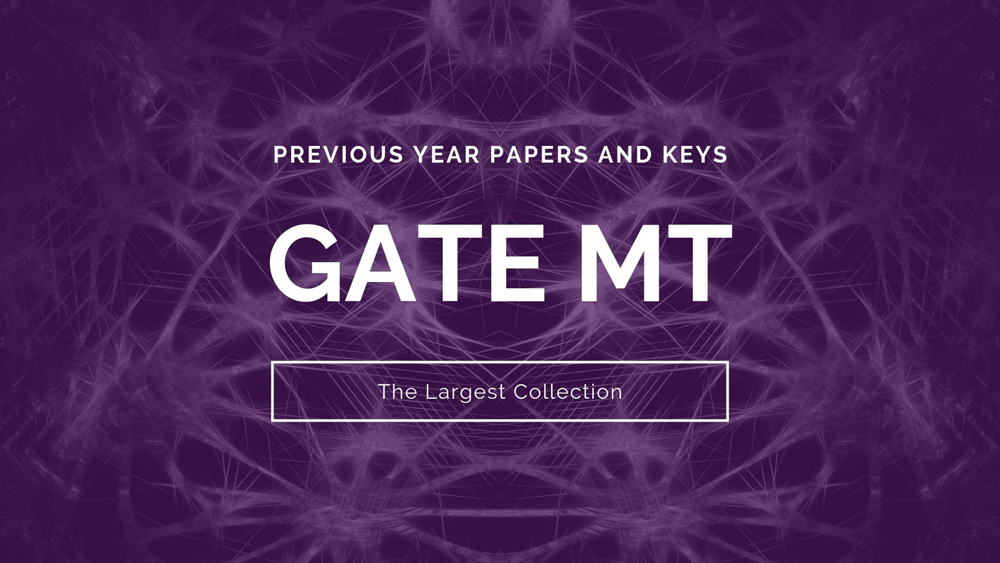Graduate Aptitude Test in Engineering (GATE) is a national level entrance examination conducted for admissions to Post Graduation programs like M. Tech, M.Arch, ME, PH.D. etc. It is held by IISc and seven IITs on behalf of NCB –GATE, MHRD, Government of India. The examination was held in the month of Feb across many cities of India. The scores of the examination are accepted by more than 900+ institutes across India and is valid for three years after the announcement of results.
Know more about GATE MT Exam:
- This examination is conducted Online and is a duration of 3-hours.
- The Question Paper has a total of 65 Questions totalling to 100 marks.
- The question paper is divided into three sections: General Aptitude, Engineering Mathematics, Subject-specific section.
- The exam contains two types of questions – Multiple Choice Questions (MCQ) and Numerical Answer Type (NAT) Questions.
Each MCQ would carry 1 or 2 marks and a choice of four answers are given, out of which the candidate must choose the correct answer. But be aware that there will be negative marking for a wrongly selected answer.
Each NAT question carry 1 or 2 marks and no choices are given. For these questions, the answer is a signed real number, which needs to be entered by the candidate using the virtual numeric keypad on the monitor The advantage here is that there is no negative marking for a wrong answer in NAT questions.
Download the detailed syllabus and a collection of previous years GATE EC Question papers to score better for the GATE Metallurgical Engineering examination. Reference to the earlier Question Papers helps in reducing mistakes resulting in reducing negative marking.
GATE 2020 MT Syllabus:
-
Section 1: Engineering Mathematics
Linear Algebra: Matrix algebra, Eigen values and eigenvectors.
Calculus: Taylor series, Mean value theorems, Stokes, Gauss and Green’s theorems.
Differential equations: Cauchy’s and Euler’s equations, Initial and boundary value problems, Laplace transforms and Laplace equation.
Complex variables: Complex number, polar form of complex number.
Probability and Statistics: Definitions of probability and sampling theorems, Poisson, Normal and Binomial distributions, Linear regression analysis.
Numerical Methods: Numerical solutions of linear and non-linear algebraic equations. Integration by trapezoidal and Simpson’s rule.
-
Section 2: Thermodynamics and Rate Processes
Laws of thermodynamics, Ellingham and phase stability diagrams, heat transfer conduction, convection and heat transfer coefficient relations, radiation, mass transfer – diffusion and Fick’s laws, mass transfer coefficients; momentum transfer, shell balances, Bernoulli’s equation, friction factors.
-
Section 3: Extractive Metallurgy
Minerals of economic importance, comminution techniques, material and energy balances; iron and steel making, metallurgical coke, blast furnace, direct reduction processes, ladle metallurgy operations including deoxidation, desulphurization, sulphide shape control, inert gas rinsing and vacuum reactors; secondary refining processes, ingot and continuous casting; furnaces and refractories.
-
Section 4: Physical Metallurgy
Crystal structure, nano-crystalline and amorphous structures; solid solutions; solidification; phase transformation and binary phase diagrams; surface treatments; recovery, recrystallization and grain growth; elements of X-ray and electron diffraction; transmission electron microscopy; introduction to electronic basis of thermal, magnetic properties of materials.
-
Section 5: Mechanical Metallurgy
Elasticity, yield criteria and plasticity; defects in crystals; tensile, fatigue and creep behaviour; super-plasticity; fracture – Griffith theory; failure analysis; mechanical testing.
-
Section 6: Manufacturing Processes
Metal casting, casting practices in sand casting, permanent mould casting, investment casting and shell moulding; Hot, warm and cold working of metals; Metal forming, Metal joining, submerged arc welding; Welding metallurgy, Powder metallurgy -compaction and sintering; NDT using dye-penetrant, ultrasonic, radiography, eddy current, acoustic emission and magnetic particle methods.
For the detailed syllabus, click on GATE MT Exam Syllabus 2020
GATE MT- Past 12 Year Papers and Keys
Reference to the earlier Question Papers helps in reducing mistakes resulting in reducing negative marking. Link for the GATE Metallurgical Engineering (MT) Previous Years Question papers with Solutions is given below:
| Sl. No | Year of GATE MT Exam | Download Link of GATE ME Previous Papers & Keys |
| 1 | 2019 | Download |
| 2 | 2018 | Download |
| 3 | 2017 | Download |
| 4 | 2016 | Download |
| 5 | 2007 – 2015 | Download |
For latest updates on GATE 2019, visit http://gate.iitm.ac.in/
